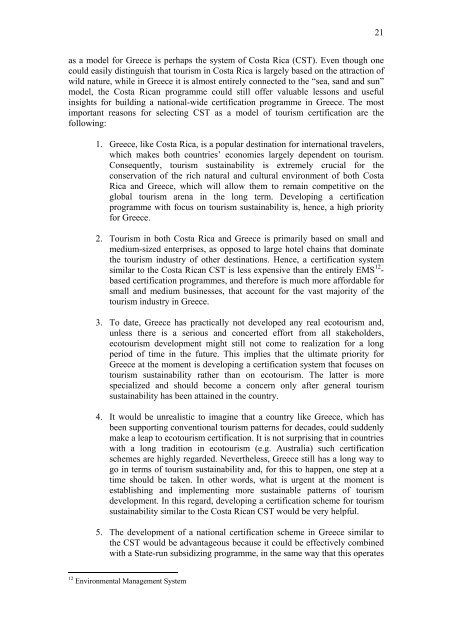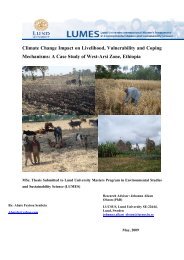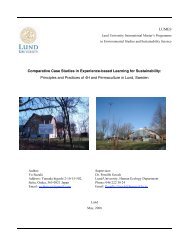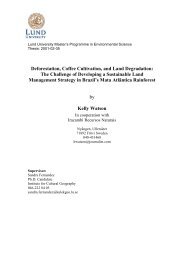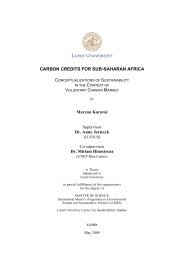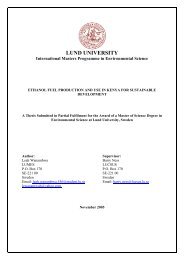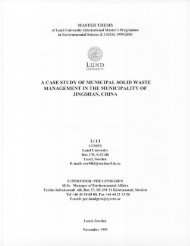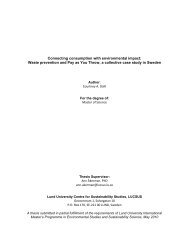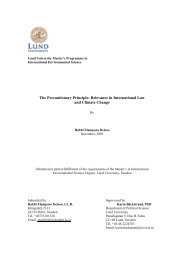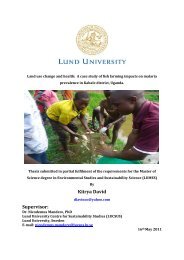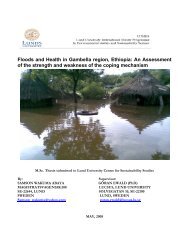Thesis title: âThe development of community-based ecotourism - lumes
Thesis title: âThe development of community-based ecotourism - lumes
Thesis title: âThe development of community-based ecotourism - lumes
You also want an ePaper? Increase the reach of your titles
YUMPU automatically turns print PDFs into web optimized ePapers that Google loves.
21as a model for Greece is perhaps the system <strong>of</strong> Costa Rica (CST). Even though onecould easily distinguish that tourism in Costa Rica is largely <strong>based</strong> on the attraction <strong>of</strong>wild nature, while in Greece it is almost entirely connected to the “sea, sand and sun”model, the Costa Rican programme could still <strong>of</strong>fer valuable lessons and usefulinsights for building a national-wide certification programme in Greece. The mostimportant reasons for selecting CST as a model <strong>of</strong> tourism certification are thefollowing:1. Greece, like Costa Rica, is a popular destination for international travelers,which makes both countries’ economies largely dependent on tourism.Consequently, tourism sustainability is extremely crucial for theconservation <strong>of</strong> the rich natural and cultural environment <strong>of</strong> both CostaRica and Greece, which will allow them to remain competitive on theglobal tourism arena in the long term. Developing a certificationprogramme with focus on tourism sustainability is, hence, a high priorityfor Greece.2. Tourism in both Costa Rica and Greece is primarily <strong>based</strong> on small andmedium-sized enterprises, as opposed to large hotel chains that dominatethe tourism industry <strong>of</strong> other destinations. Hence, a certification systemsimilar to the Costa Rican CST is less expensive than the entirely EMS 12 -<strong>based</strong> certification programmes, and therefore is much more affordable forsmall and medium businesses, that account for the vast majority <strong>of</strong> thetourism industry in Greece.3. To date, Greece has practically not developed any real <strong>ecotourism</strong> and,unless there is a serious and concerted effort from all stakeholders,<strong>ecotourism</strong> <strong>development</strong> might still not come to realization for a longperiod <strong>of</strong> time in the future. This implies that the ultimate priority forGreece at the moment is developing a certification system that focuses ontourism sustainability rather than on <strong>ecotourism</strong>. The latter is morespecialized and should become a concern only after general tourismsustainability has been attained in the country.4. It would be unrealistic to imagine that a country like Greece, which hasbeen supporting conventional tourism patterns for decades, could suddenlymake a leap to <strong>ecotourism</strong> certification. It is not surprising that in countrieswith a long tradition in <strong>ecotourism</strong> (e.g. Australia) such certificationschemes are highly regarded. Nevertheless, Greece still has a long way togo in terms <strong>of</strong> tourism sustainability and, for this to happen, one step at atime should be taken. In other words, what is urgent at the moment isestablishing and implementing more sustainable patterns <strong>of</strong> tourism<strong>development</strong>. In this regard, developing a certification scheme for tourismsustainability similar to the Costa Rican CST would be very helpful.5. The <strong>development</strong> <strong>of</strong> a national certification scheme in Greece similar tothe CST would be advantageous because it could be effectively combinedwith a State-run subsidizing programme, in the same way that this operates12 Environmental Management System


